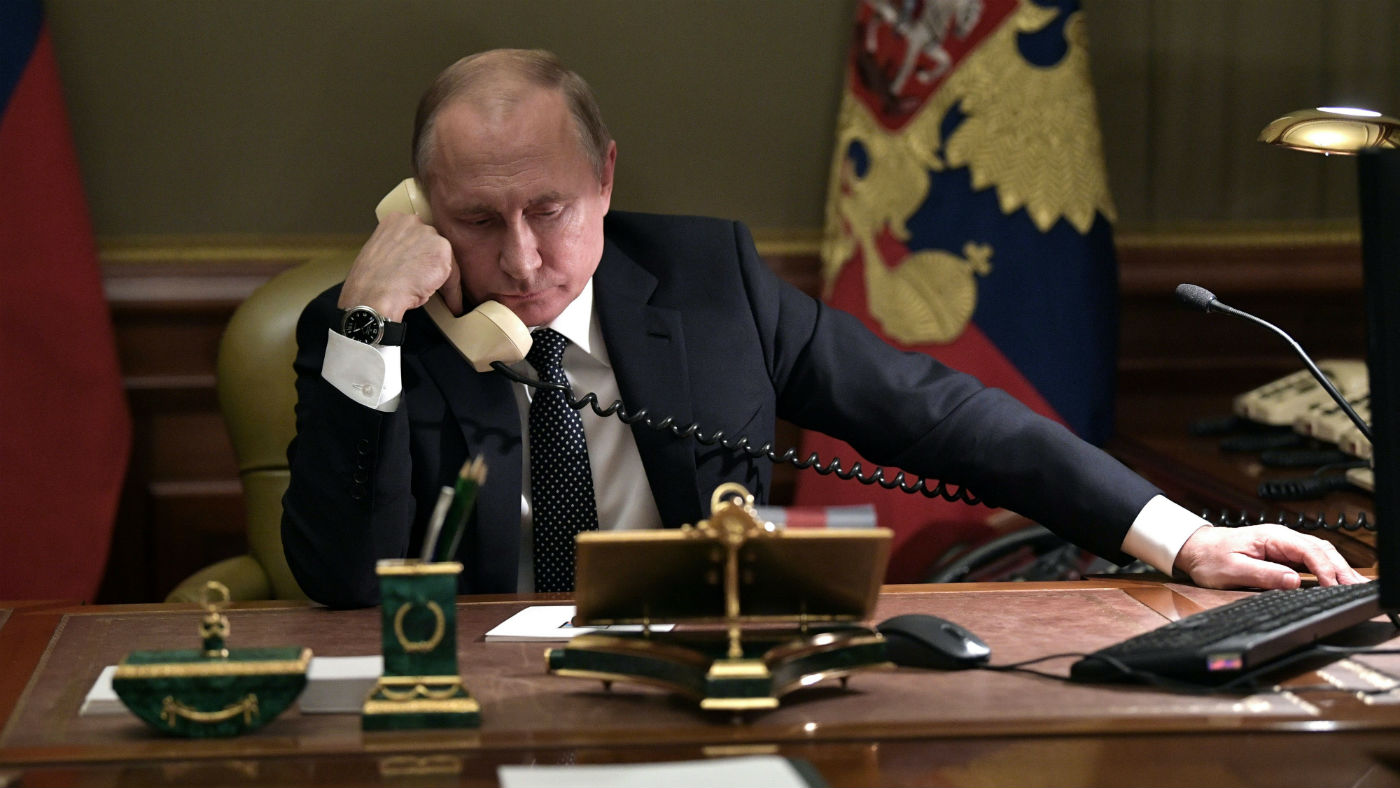Vladimir Putin ups the nuclear ante against the West
Russia says it may be forced to aim weapons at Washington and cut strike time

A free daily email with the biggest news stories of the day – and the best features from TheWeek.com
You are now subscribed
Your newsletter sign-up was successful
Vladimir Putin has threatened to develop new long-range weapons to target Western capitals and cut nuclear strike times, in what has been interpreted as a serious but deliberate escalation in arms race rhetoric.
In a major speech on the state of the nation, the Russian president warned that if the West deployed new short and medium-range missiles in Europe that had the potential to reach Moscow in less than ten minutes, Russian missiles would be re-directed towards Western “centres of decision-making”.
The Guardian says “the threat, which appears to describe Washington and other western capitals, came after the United States and then Russia suspended compliance with the 1987 Intermediate-Range Nuclear Forces treaty”.
The Week
Escape your echo chamber. Get the facts behind the news, plus analysis from multiple perspectives.

Sign up for The Week's Free Newsletters
From our morning news briefing to a weekly Good News Newsletter, get the best of The Week delivered directly to your inbox.
From our morning news briefing to a weekly Good News Newsletter, get the best of The Week delivered directly to your inbox.
While emphasising Russia would not strike first, these were Putin’s “toughest remarks yet on a potential new arms race”, says Reuters, although he “did not confirm how, technically, Russia would deploy missiles with a shorter strike time”.
The news agency says “possible options include deploying them on the soil of an ally near US territory, deploying faster missiles on submarines, or using one of the hypersonic weapons Moscow says it has under development”.
Putin’s speech revealed details about a hypersonic missile called Tsirkon that could travel up to 1,000km and would be able to strike land targets.
“Nuclear saber-rattling has become key to the Kremlin’s projection of power both at home and abroad, and could be an attempt to bring Washington to the negotiating table,” says The Washington Post.
A free daily email with the biggest news stories of the day – and the best features from TheWeek.com
Last year, Putin used the address to unveil a new arsenal of weapons in a nearly two-hour speech “that stunned the West and many in Russia”, says the Daily Mail.
Following that speech his approval rating surged to its highest level since he came to power in 1999 but, “a year on, Putin has seen his popularity slide against a backdrop of economic problems”, says the Mail.
A hugely unpopular reform raising the age of retirement saw his approval rating drop to 64% in January, the lowest since before Moscow's annexation of Crimea five years ago. Another poll, by the Levada Centre taken last October around the time the pension reform was signed into law, found only 40% of Russians would vote for Putin if an election were held.
-
 How the FCC’s ‘equal time’ rule works
How the FCC’s ‘equal time’ rule worksIn the Spotlight The law is at the heart of the Colbert-CBS conflict
-
 What is the endgame in the DHS shutdown?
What is the endgame in the DHS shutdown?Today’s Big Question Democrats want to rein in ICE’s immigration crackdown
-
 ‘Poor time management isn’t just an inconvenience’
‘Poor time management isn’t just an inconvenience’Instant Opinion Opinion, comment and editorials of the day
-
 Putin’s shadow war
Putin’s shadow warFeature The Kremlin is waging a campaign of sabotage and subversion against Ukraine’s allies in the West
-
 Alexei Navalny and Russia’s history of poisonings
Alexei Navalny and Russia’s history of poisoningsThe Explainer ‘Precise’ and ‘deniable’, the Kremlin’s use of poison to silence critics has become a ’geopolitical signature flourish’
-
 US, Russia restart military dialogue as treaty ends
US, Russia restart military dialogue as treaty endsSpeed Read New START was the last remaining nuclear arms treaty between the countries
-
 What happens now that the US-Russia nuclear treaty is expiring?
What happens now that the US-Russia nuclear treaty is expiring?TODAY’S BIG QUESTION Weapons experts worry that the end of the New START treaty marks the beginning of a 21st-century atomic arms race
-
 Epstein files topple law CEO, roil UK government
Epstein files topple law CEO, roil UK governmentSpeed Read Peter Mandelson, Britain’s former ambassador to the US, is caught up in the scandal
-
 Iran and US prepare to meet after skirmishes
Iran and US prepare to meet after skirmishesSpeed Read The incident comes amid heightened tensions in the Middle East
-
 Israel retrieves final hostage’s body from Gaza
Israel retrieves final hostage’s body from GazaSpeed Read The 24-year-old police officer was killed during the initial Hamas attack
-
 China’s Xi targets top general in growing purge
China’s Xi targets top general in growing purgeSpeed Read Zhang Youxia is being investigated over ‘grave violations’ of the law